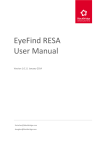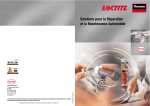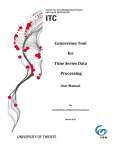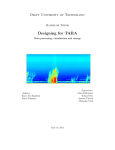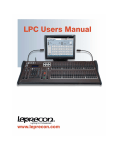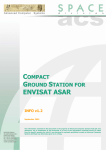Download EyeFind User Guide
Transcript
EyeFind User Guide For Version 1.2.3 | June 2013 www.blackbridge.com [email protected] Contents 1 1.1 1.2 1.3 INTRODUCTION .......................................................................................................................................... 5 EyeFind: AN Introduction ................................................................................................................................... 5 Known Limitations ............................................................................................................................................. 5 Getting started with EyeFind ............................................................................................................................. 5 2 2.1. 2.2. 2.2.1. 2.2.2. 2.2.3. 2.2.4. 2.2.5. 2.2.6. 2.3. 2.3.1. 2.3.2. 2.3.3. 2.4. SEARCHING THE RAPIDEYE ARCHIVE ........................................................................................................... 7 Basic Parameters ................................................................................................................................................ 7 Defining an Area of Interest (AOI)...................................................................................................................... 7 Political Boundaries ......................................................................................................................................... 7 RapidEye IDs .................................................................................................................................................... 8 File upload ....................................................................................................................................................... 8 Draw on Map ................................................................................................................................................... 8 Coordinates ...................................................................................................................................................... 8 AOI Size Calculation ......................................................................................................................................... 9 Advanced Parameter Settings ............................................................................................................................ 9 Range Settings ................................................................................................................................................. 9 Bands ............................................................................................................................................................... 9 Spacecraft ...................................................................................................................................................... 10 Advance Search Options .................................................................................................................................. 10 3 3.1. 3.2. 3.3. MAP AND RESULT HANDLING ................................................................................................................... 11 Map Navigation ................................................................................................................................................ 11 Layer Management .......................................................................................................................................... 11 Additional Map Information ............................................................................................................................ 11 4 4.1. 4.2. 4.3. RESULTS ANALYSIS .................................................................................................................................... 12 Result Set Functions ......................................................................................................................................... 12 Dataset Functions ............................................................................................................................................ 12 Image Metadata ............................................................................................................................................... 14 5 5.1. 5.2. 5.3. 5.4. 5.5. 5.6. 5.7. SESSION UTILITIES ..................................................................................................................................... 15 Restore Last Session ......................................................................................................................................... 15 Query 1B to 3A Function .................................................................................................................................. 15 Save Sessions ................................................................................................................................................... 15 List of Saved Sessions ....................................................................................................................................... 15 Share Sessions .................................................................................................................................................. 15 Restore Sessions .............................................................................................................................................. 16 Delete Sessions ................................................................................................................................................ 16 Tables Table 1: Basic Search Parameters ................................................................................................................................. 7 Table 2: AOI Coordinate Selection Options ................................................................................................................... 9 Table 3: Advanced Parameter Settings ......................................................................................................................... 9 Table 4: Advanced Search Options .............................................................................................................................. 10 Table 5: Map Navigation Options ................................................................................................................................ 11 Table 6: Fields of the Resultset Table .......................................................................................................................... 12 EyeFind User Guide v 1.2.3 2 Table 7: Result Set Functions ...................................................................................................................................... 12 Table 8: Dataset Functions .......................................................................................................................................... 13 Table 9: Image Metadata Field .................................................................................................................................... 14 Table 10: Saved Session Information .......................................................................................................................... 15 Illustrations Figure 1: Overview of the EyeFind application web page ............................................................................................. 6 Figure 2: EyeFind Tab panel .......................................................................................................................................... 6 EyeFind User Guide v 1.2.3 3 ABBREVIATIONS AOI Area of Interest CSV Comma Separated Value file EPSG European Petroleum Survey Group JPEG Joint Photographic Experts Group KML Keyhole Markup Language file KMZ Keyhole Markup Language files Zipped NIR Near Infra-red PNG Portable Network Graphic image format TIFF Tagged Image File Format UTC Coordinated Universal Time UTM Universal Transverse Mercator WGS84 World Geodetic System 1984 EyeFind User Guide v 1.2.3 4 1 INTRODUCTION 1.1 EYEFIND: AN INTRODUCTION The purpose of this document is to provide the user with an insight on how to work with the EyeFind application. After reading this document, the user should know: How to search for imagery in RapidEye EyeFind application How to navigate through the base map How to get additional information about the results of a search How to save and restore search or query sessions In case of questions or if any problems are encountered, please send an email to: [email protected] 1.2 KNOWN LIMITATIONS The following is a list of known limitations. We are currently working on solutions for these problems in future releases of EyeFind: Queries for level 1B data you may produce additional datasets in the results which are outside the defined area of interest. 1.3 GETTING STARTED WITH EYEFIND The application can be found at: http://eyefind.blackbridge.com/ The following are system requirements for using the application: enabled JavaScript enabled cookies minimum screen resolution 1024 x 768 Firefox version 2 or higher, or IE version 8 or higher EyeFind User Guide v 1.2.3 5 Figure 1: Overview of the EyeFind application web page Figure 2: EyeFind Tab panel EyeFind User Guide v 1.2.3 6 2 SEARCHING THE RAPIDEYE ARCHIVE To begin a search of the RapidEye archive using EyeFind, the search criteria must first be set. This can be done under the ‘Query’ tab which is visible upon opening the application (Figure 2). There, the following parameters can be defined: Basic Parameters Defining an Area of Interest (AOI) Advanced parameters settings Advanced Search Options Each of these parameter groups is described in more detail in the following sections. 2.1. BASIC PARAMETERS The Basic parameters needed for a search are described in the follow table. NAME DESCRIPTION Start Date The start date of your time of interest End Date The end date of your time of interest Cloud Cover The maximum acceptable percentage of cloud cover for a given image Black Fill The maximum acceptable percentage of black fill (non-imaged pixels) for a given tile (3A product search only) Seasonal If this box is checked, EyeFind will initiate the search for the given time window for every year, starting from the start date year till the end date year For example: Start date: 2011-01-01, and End date: 2013-02-01, will search for items from: 2011-01-01 to 2011-02-01, 2012-01-01 to 2012-02-01, and 2013-01-01 to 2013-0201 Area of Interest The geographic extent of the search query. There are several ways to define an Area of Interest (see below for details) Product Type Option are Level 3A (tiled, ortho product) or Level 1B (full image take, basic product) Table 1: Basic Search Parameters 2.2. DEFINING AN AREA OF INTEREST (AOI) There are several different ways to define an Area of Interest (AOI) for a search query. Depending on the selection of the mode, the input parameters change. 2.2.1. Political Boundaries The option "Political Boundaries" allows the user to define the AOI by countries and their subordinate administrative regions, such as states or provinces. By using the pull down list, the user can select or type the name of the country desired to use for a search query. The administrative regions are reduced to the selected country once selected. The administrative region is an optional field. EyeFind User Guide v 1.2.3 7 2.2.2. RapidEye IDs Selecting ‘RapidEye IDs’ allows the user to define the AOI by a list of either RapidEye tile IDs or catalog IDs. Both lists require the user to separate each selection by a comma and a space (example 1262009, 1460721, 1657404). If Catalog IDs are defined, the Start and End date fields are no longer required. 2.2.3. File upload This option allows for the possibility to define the AOI by uploading a preexisting shapefile or KML/KMZ file. Use the "Browse" button to select the desired file from the local computer. The selected file must meet one of the following specifications: Option 1: The file is a zip archive The zip archive contains at least the .shp and .shx file of a shapefile The zip archive may contain a .prj file which will be used to define the projection. If no .prj file is provided, geographic coordinates in WGS84 will be applied (EPSG code 4326) The shapefile must contain shapes of type POLYGON or MULTIPOLYGON The shapefile may contain one or many shapes Option 2: The file is a KML or KMZ file The file must contain shapes of type POLYGON or MULTIPOLYGON The file may contain one or many shapes 2.2.4. Draw on Map This option allows the user to draw a polygon AOI on the map. The default setting for this option is set to 'navigate' allowing the user to navigate to the correct location before starting to draw the AOI polygon. Once 'draw' is selected, the options 'Box', 'Circle' and 'Polygon' options become active allowing the user to draw boxes, circles and free hand polygons on the map. One or more polygons can be drawn. If a polygon is lost, misplaced, or incorrectly drawn, it can be deleted by selecting the 'Delete last drawn polygon' button. To delete all drawn features at once, use the 'Delete all polygons' button. 2.2.5. Coordinates This option allows the user the possibility to set the AOI with a box defined by the upper left (UL) and lower right (LR) corners. Each coordinate is defined in the range of -180 and 180 for the longitude and -90 to 90 for the latitude. Table 2 lists several options for defining an AOI using coordinates. EyeFind User Guide v 1.2.3 8 OPTION DESCRIPTION Decimal (Box) The upper left and lower right corner of the bounding box must be provided in decimal degrees DD-MM-SS (Box) The upper left and lower right corner of the bounding box must be provided in sexagesimal degrees, e.g. in degree, minutes and seconds Decimal (Point + Distance) A coordinate pair in decimal degrees to define the center of the bounding box and a distance from this point which defines the approximate distance of the center point to the boundary of the bounding box must be provided DD-MM-SS (Point + Distance) A coordinate pair in sexagesimal degrees to define the center of the bounding box and a distance from this point which defines the approximate distance of the center point to the boundary of the bounding box must be provided Table 2: AOI Coordinate Selection Options 2.2.6. AOI Size Calculation The area of the AOI is calculated using the Geography datatype in Postgis. If multiple polygons are detected in the AOI, these polygons are merged. Projection used is EPSG code 4326 (Geographic, WGS84). 2.3. ADVANCED PARAMETER SETTINGS 2.3.1. Range Settings The advance parameter settings allow the user to further constrain the search criteria by setting a defined range for each of the parameters listed in Table 3. If the minimum or maximum value is not given, the lowest or highest possible value will be taken for these parameters. PARAMETER NAME DESCRIPTION Spacecraft View Angle Spacecraft view angle is the across-track off-nadir viewing angle of the satellite (sensor) in degrees with "+" being East and "-" being West Sun Elevation The angle of the sun in degrees to the plane of the image at the image center Sun Azimuth The sun azimuth at the center of the image in degrees Sun Azimuth Angle Angle, in clockwise positive degrees from true north at the image center to the scan (line) direction at image center, in the range of 0.0 to 360.0 Missing Lines Band (1,2,3,4,5) Percentage of missing data per band Table 3: Advanced Parameter Settings 2.3.2. Bands The 'Bands' section allows the user to define which color bands are desired for the image search with the default set to all available bands. All images which have at least those selected bands will be taken into account, meaning some of the resulting images might have more bands than those requested. EyeFind User Guide v 1.2.3 9 2.3.3. Spacecraft The ‘Spacecraft’ section allows the user to define which spacecraft shall be taken into account for the search. If a spacecraft is checked, images which were taken by this spacecraft will be included in the result list. 2.4. ADVANCE SEARCH OPTIONS The advanced search options are described in Table 4. OPTION DESCRIPTION Lock AOI The AOI of the previous search will be used in the current search and will remain until this checkbox is unchecked Suppress quicklook layer If this option is selected, the number of maximum results will be raised from 20,000 to 50,000 Limit number of results per tile This option allows the user to define the maximum number of results returned per tile. In selecting this option, not all possible results for a tile will be shown, but only the best ones up to the number selected Table 4: Advanced Search Options EyeFind User Guide v 1.2.3 10 3 MAP AND RESULT HANDLING 3.1. MAP NAVIGATION Table 5 lists the available methods to zoom or pan around the map. ACTION BEHAVIOR Mouse wheel The mouse wheel can be used to zoom in and out. The position of the mouse pointer defines the point where the zoom will be centered Shift + Drag a box By pressing the shift button a box can be drawn with the mouse, which defines the new extent of the map. If the box does not fit into the map window the extent of the map will automatically be adapted to be entirely contained in the map window Slider bar The slider bar in the top left corner of the map allows the user to zoom in and out of the map. Zooming will occur around the center of the map Pressed mouse button Left click on the map and hold the mouse button down, drag the cursor to the desired location and release Table 5: Map Navigation Options 3.2. LAYER MANAGEMENT The displayed map layers can be managed under the tab ‘Layer’ on the left side of the application window. Here the user can: Switch on and off layers by checking or unchecking the applicable boxes with the changes being applied immediately to the map Change the drawing order of the layers by dragging the layers with the mouse to the desired position 3.3. ADDITIONAL MAP INFORMATION The following additional information is displayed on the map: The coordinates on the lower right corner of the map show the coordinates of the mouse pointer in decimal degrees The scale in kilometer and miles is indicated in the lower left corner. Please note that they will be approximate values since the map is shown in geographic coordinates EyeFind User Guide v 1.2.3 11 4 RESULTS ANALYSIS Upon the successful completion of a query, the ‘Resultset’ tab automatically opens to display results in a table. The Resultset table displays the following information: NAME DESCRIPTION Image A thumbnail of the image Functions Additional selections which trigger a dataset specific function (see next section) Acquired at The acquisition date of the dataset Clouds An estimation of the percentage of the tile covered by clouds (not black fill) Black fill The percentage of the tile containing black fill Catalog ID The catalog ID of the dataset Table 6: Fields of the Resultset Table The search functionality looks for the best images that meet the specified parameters. Those images which have been automatically selected as the best are displayed on the map and appear in the table with the box checked. All other results for a given tile are displayed in the table unchecked. These results will not be displayed on the map unless the user manually selects them. For tiles with more than one image selected, the image displayed on the map will correspond to the first checked image. To display images on the map that are further down the image list, then upper most image must be deselected. 4.1. RESULT SET FUNCTIONS Table 7 describes the button functions located in the Resultset table. FUNCTION DESCRIPTION Each dataset can be switched on and off as desired by selecting or de-selecting the checkbox in the first column of the table. After making this selection, the "Update map" button at the top of the table must be clicked before the new results are displayed on the map This button opens a separate window which displays a quicklook of the image at a higher resolution, along with additional information (metadata) about the image (see "Image Metadata" section for more details) By clicking this button the map will zoom to the extent of the associated image By clicking on this button the extent of the associated image will be highlighted on the map. Only the extent of the last selected image is shown on the map. To remove the highlighted feature, choose the ‘Layer’ tab and deselect the layer "Highlighted Feature" Table 7: Result Set Functions The functionality of the map and table works interchangeably with the functions of the Resultset. Additionally, by simply clicking an image on the map, the application will automatically scroll the table to the desired image. 4.2. DATASET FUNCTIONS At the top of the ‘Resultset’ tab there are several buttons which allow operations to be performed on the entire EyeFind User Guide v 1.2.3 12 search dataset. Table 8 describes the actions of each button. FUNCTION DESCRIPTION This button allows the user to redraw the map taking into account all images which are currently selected in the table. The extent of the map will not be changed by this function, and this is only required to redraw the map after a manual change has been made to the image selection This button allows the user to redraw the map to the extents of all images which are currently selected This function allows for the queried catalog metadata to be downloaded for further analysis. Only metadata for checked images will be included in the download process. The following download options exist: Catalog IDs: A file containing the catalog IDs of the selected images separated with a comma and a space (.csv) Result Shapefile: A shapefile containing the extent of all selected images as a single shape (contiguous or non-contiguous) in the shapefile AOI Shapefile: A shapefile containing the extents of the AOI used in the search KML: A kml file containing the extent of all selected images, each as one feature in the kml file Quicklooks: A zip archive containing all quicklooks of the selected images Image format: An image which shows the content of the current map with all currently enabled layers and with the same extent as used in the map. Available formats are 'jpeg', 'png' or 'geotiff' Image width: Width of the produced images in pixels. The default is the width of the map which is displayed in the web browser Image height: Height of the produced images in pixels. The default is the height of the map which is displayed in the web browser E-Mail: Email address to use for notification when the desired information is ready for download as a zip file. If an email address is not entered, the user will receive a zip file for download directly One or more options can be selected for download. The download delivers a zip archive which contains all files for the selected options. The user can then select the following buttons: Submit: Sends the request for the desired information Clear: Clears all entries in the input fields Close: Closes the download window This function allows the user to send a request for quote to the RapidEye Support team. By clicking this button, a window opens which allowing the user to enter some contact information. Select/Deselect all By checking this box at the top of the results table, all result sets (including those which are items not shown in the current table page) will be selected or deselected Table 8: Dataset Functions EyeFind User Guide v 1.2.3 13 4.3. IMAGE METADATA Table 9 lists the metadata fields that are displayed for each image along with the quicklook NAME DESCRIPTION Catalog ID Unique catalog number identifying the image Tile ID (Level 3A data only) Tile ID as defined in the RapidEye tile grid APS Image Take ID A unique identifier of the parent image (mainly used for internal purposes) Continent (Level 3A data only) Name(s) of the continent(s) on which the tile is located Country (Level 3A data only) Name(s) of the country/countries in which the tile is located Administration unit (Level 3A data only) Name(s) of the administrative region(s) in which the tile is located Left upper longitude Longitude of the left upper corner of the extent of the image Left upper latitude Latitude of the left upper corner of the extent of the image Unusable data percentage (Level 3A data only) The percentage of the tile which is either blackfill or covered with clouds Black fill (Level 3A data only) The percentage of the tile which is blackfill, intersected with the corresponding image take. They may appear as pixels with a value of “0” or as “noData” depending on the viewing software Effective cloud coverage Cloud coverage percentage for the image (not including black fill) Spacecraft View Angle Across-track off-nadir viewing angle of the satellite (sensor) in degrees with "+" being East and "-" being West Azimuth Angle Angle, in clockwise positive degrees from true north at the image center to the scan (line) direction at image center, in the range of 0.0 to 360.0 Sun Azimuth Sun azimuth at the center of the image in degrees Sun Elevation Sun elevation at the center of the image in degrees Space Craft ID ID of the space craft which took the image Missing Lines Band (1,2,3,4,5) Table 9: Image Metadata Field Percentage of missing data per band EyeFind User Guide v 1.2.3 14 5 SESSION UTILITIES This section provides details on how to restore the last session, save query results and share them with other people, as well as how to restore and delete sessions. The described functionality can be found under the ‘Session’ tab. 5.1. RESTORE LAST SESSION If the web browser is closed without saving the session, this button allows the user to restore the last search. 5.2. QUERY 1B TO 3A FUNCTION This button turns a query of image take tiles (Level 3A Ortho product) to image takes (1B Basic product) query and vice versa. The original AOI will be preserved. Note: Subsequent query conversions after the first conversion may not return the results of the initial query exactly. 5.3. SAVE SESSIONS This functionality allows query settings and the result set to be saved at any point in time. Type in a name for a session to be saved in the ‘Session Name’ box, this will be the name under which the session is stored and under which you can retrieve it later. Next, select the 'Save' button to save the session on the server. A URL should appear in the ‘Saved Session’ portion of the tab. 5.4. LIST OF SAVED SESSIONS At the bottom of the 'Session' tab a list of all saved sessions is located. All sessions older than 30 days will automatically be removed from the server and will not show up any more in this table. The table displays the following data per session: NAME DESCRIPTION Name The name of saved session. If the same name is entered several times, a version number will be added to the name of the session Created The date and time at which the session has been created Actions Icons to restore and delete the session URL URL of the session Table 10: Saved Session Information 5.5. SHARE SESSIONS To share the results of a query with another person, send the URL of the desired session once a session has been saved. The new user can then open the URL in a browser and the results of the search will be loaded. EyeFind User Guide v 1.2.3 15 5.6. RESTORE SESSIONS If the URL of a pre-existing session is known, it can be pasted into a browser to restore it. Additionally, by selecting the 'Session' tab and locating the desired session in the 'Saved Sessions' table, clicking on the first icon in the Actions column will restore the session. 5.7. DELETE SESSIONS To delete a session, locate the right session in the table 'Saved Sessions' and click the second icon in the Actions column of the corresponding session. EyeFind User Guide v 1.2.3 16
















